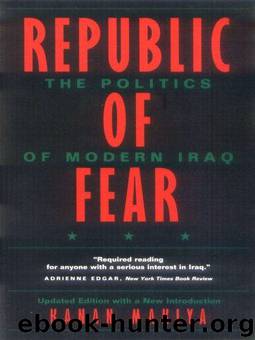Republic of Fear: The Politics of Modern Iraq, Updated Edition by Kanan Makiya

Author:Kanan Makiya [Makiya, Kanan]
Language: eng
Format: mobi
Publisher: University of California Press - A
Published: 1998-06-14T22:00:00+00:00
The historical importance of what happened in Iraq that summer lies not in the events themselves but in how they were interpreted by the population. All accounts are unanimous in describing the overwhelming popular enthusiasm for the army’s actions. In the city of Mosul, triumphal arches were set up, “decorated with melons stained with blood and with daggers stuck into them. This delicate representation of the heads of the slain Assyrians was in keeping with the prevailing sentiment.” 276 K. Husri, then a young boy, was an eyewitness to the army’s reception in Baghdad:On 26 August practically the entire city turned out to welcome the army units returning after completion of their operations against the Assyrians. Thousands upon thousands of men, women, and children filled the streets, the squares, and rooftops of the city, bringing everything to a standstill for hours. The immense crowds cheered deliriously as the troops marched through the capital. Men, women, and children showered flowers and rose water on them from the roof-tops. The writer well remembers that on that day he and his sister were allowed to pick all the roses and flowers of their garden ... scattering their contents on the heads of the marching troops from the balcony of a doctor’s clinic overlooking Rashid street. Planes of the Iraqi air force flew over the city, raining coloured leaflets that carried the following words written by a welcoming committee: “Welcome, Protectors of the Fatherland! ... Stand up to Your Enemies the Tools and Creatures of Imperialism!” The army and Crown Prince Ghazi, whose openly displayed approval of the campaign against the Assyrians had made him the darling of the masses, were cheered to the heavens. But few cheers were lifted for Faysal.... The same thing happened five days later when almost all Baghdad turned out again to greet Ghazi, Bakr Sidqi, and Rashid ‘Ali, on their return to the capital from a ceremonial parade of the army at Mosul. When Faysal left Baghdad on 2 September there were hardly more than fifty people to see him off in the airport; two days earlier there had been a crowd of 50,000 men in the same airport greeting Ghazi on his return from Mosul.
The writer met Bakr Sidqi for the first time a few days after his return from Mosul. When he patted me on the shoulder and asked me what I wanted to be when I finished school, I said: an army officer.277
Download
This site does not store any files on its server. We only index and link to content provided by other sites. Please contact the content providers to delete copyright contents if any and email us, we'll remove relevant links or contents immediately.
| Arms Control | Diplomacy |
| Security | Trades & Tariffs |
| Treaties | African |
| Asian | Australian & Oceanian |
| Canadian | Caribbean & Latin American |
| European | Middle Eastern |
| Russian & Former Soviet Union |
The Secret History by Donna Tartt(19092)
The Social Justice Warrior Handbook by Lisa De Pasquale(12190)
Thirteen Reasons Why by Jay Asher(8912)
This Is How You Lose Her by Junot Diaz(6887)
Weapons of Math Destruction by Cathy O'Neil(6281)
Zero to One by Peter Thiel(5802)
Beartown by Fredrik Backman(5755)
The Myth of the Strong Leader by Archie Brown(5508)
The Fire Next Time by James Baldwin(5447)
How Democracies Die by Steven Levitsky & Daniel Ziblatt(5219)
Promise Me, Dad by Joe Biden(5154)
Stone's Rules by Roger Stone(5088)
A Higher Loyalty: Truth, Lies, and Leadership by James Comey(4964)
100 Deadly Skills by Clint Emerson(4926)
Rise and Kill First by Ronen Bergman(4790)
Secrecy World by Jake Bernstein(4753)
The David Icke Guide to the Global Conspiracy (and how to end it) by David Icke(4720)
The Farm by Tom Rob Smith(4514)
The Doomsday Machine by Daniel Ellsberg(4490)
